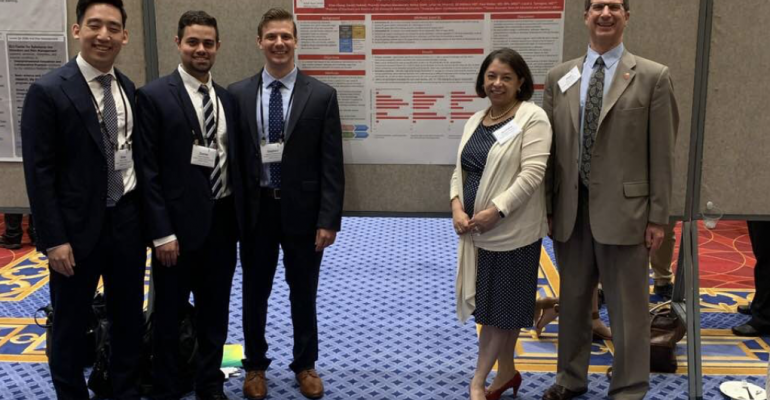Dr. Archana Pradhan walks an interesting path through the world of medical education. As associate dean for clinical education and associate professor in the department of obstetrics, gynecology, and reproductive sciences at Rutgers Robert Wood Johnson Medical School in New Brunswick, N.J., Pradhan educates aspiring doctors, which includes mentoring them as they create poster sessions for medical conferences.
“We mentors review the research as it is being developed, the data as it is being collected, and the conclusions as they are being drawn,” she says. “The students are challenged to become self-directed learners as well as to develop a slide deck to present to the physicians who are their mentors. In return, we provide them with feedback on both the content and their delivery.”
At a May 2019 opioid-abuse conference run by the Association of American Medical Colleges, Pradhan proudly observed some of her students as they educated doctors in the real world. “Their presentation was a wonderful example of students who are going into different specialties—emergency medicine, anesthesia, orthopedics, and others—coming together to address a topic—an epidemic, actually—that every specialty will see in practice,” she says. “They covered how to incorporate naloxone [opioid overdose treatment] training into a medical school curriculum. They took turns presenting and got a strong reception, in large part because they were medical students in an attending crowd.”
The Doctor Is in (the Meeting Venue)
Pradhan also participates in a few conferences each year herself as either an attendee or a presenter, and draws on her experience as a student educator to make her conference appearances most effective in whichever capacity she is serving. Across her 20 years as a doctor, the most important and useful things that “attendee Pradhan” takes back to her office and classroom are new guidelines for medical practices, innovative ideas for research, education, and clinical practice, and CME credit, of course. She also finds the networking element to be essential for understanding different factors that affect how her colleagues go about their work in other medical schools and in clinical environments, too.
There is, however, the ever-present budgetary factor that brings uncertainty to the number of conferences Pradhan and her fellow physicians at Rutgers RWJ Medical School can attend each year. “This is particularly difficult for those of us working in academic health centers,” she says. “The budget for conference attendance always seems to decrease a bit, while the cost to attend always seems to creep up a bit.”
Pradhan adds that while “we doctors know that in-person events are still very important,” online education that is interactive is a formidable challenger. “In my experience, practitioners tend to prefer the in-person medium over the electronic medium if they are in an earlier stage of their career; if they are in academic medicine versus private practice; and if they are male.”
When Pradhan takes on the role of a conference presenter, she structures her content delivery to account for the demographics of those who will be in the room. “Older practitioners want the data up front before you come to any conclusions; they are okay with a review of all the studies and data,” she notes. “On the other hand, Millennials want you to be relatable and interactive, and to use more visuals if you must review studies and data” before presenting conclusions. For a diverse crowd, then, “presenters must think about how they can deliver the same information in different ways” to connect with everyone.
Lastly, Pradhan has this advice for planners of medical conferences and expos on drawing attendees of all ages: “Make sure to demonstrate not just the quality of the educational sessions, but all the value-added elements that come from attending that in-person event.”





